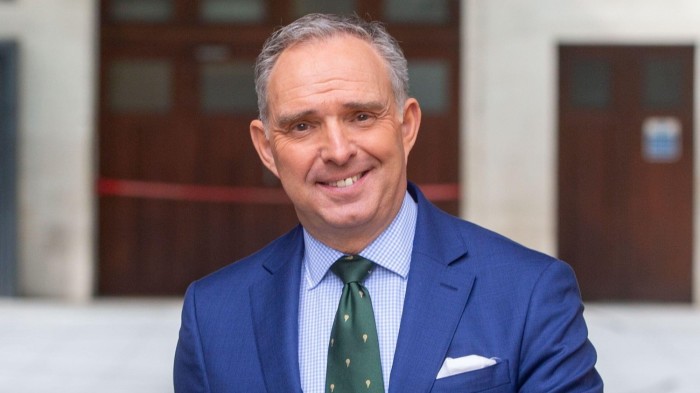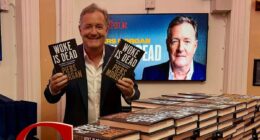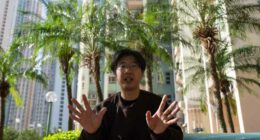Share this @internewscast.com
Lord Mark Sedwill, the former UK national security adviser, has intensified scrutiny on Sir Keir Starmer regarding a botched Chinese espionage case by affirming that Beijing undeniably poses a direct threat to national security.
Sedwill expressed his bewilderment over the collapse of the trial involving Christopher Berry and Christopher Cash, who were accused of leaking secrets to China last month. Both individuals have consistently denied the allegations.
During an interview on The Crisis Room podcast, Sedwill remarked, “The reality is that China is undoubtedly a national security threat to the UK, through cyber activities, espionage, among other means.”
This week, prosecutors indicated that the trial fell apart because the government declined to present a witness to officially state that China was “a threat to the UK’s national security”.
The prime minister has maintained that Beijing was not categorized as an adversary by the previous administration during the time of the alleged activities from 2021 to 2023.
Christopher Cash, 30, previously a parliamentary researcher, and Christopher Berry, 33, a former educator in China, were charged by the Crown Prosecution Service in 2024 for allegedly conducting espionage on UK parliamentarians at Westminster for China.
Both men have always denied any wrongdoing and have said the case’s collapse proved their innocence.
Starmer will come under new pressure to explain the background to the case when parliament returns from its conference season recess on Monday.
Speaking at a press conference in Mumbai on Thursday, Starmer insisted: “I can be absolutely clear, no ministers were involved in any of the decisions since this government’s been in, in relation to the evidence that’s put before the court on this issue.
“The evidence was the evidence as it then was; that’s the only relevant evidence, and that evidence was the situation as it was under the last government, the Tory government, rather than under this government.”
The saga has put a spotlight on Jonathan Powell, Starmer’s national security adviser, who has over his long career helped untangle some of the most challenging foreign policy problems in the world: from helping deliver peace in Northern Ireland to keeping rival Libyan warlords apart.

Critics believe Powell, appointed by the Labour government last November, is behind a pattern of behaviour that has seen ministers soft pedal public criticism of China at a time when Starmer is keen to boost trade and investment.
Powell, who served as Tony Blair’s chief of staff in the last Labour government, has played a critical role in shaping the UK’s approach to the complicated question of China engagement.
Prosecutors have said the UK government would not deliver evidence to show China was a threat to Britain’s national security at the time of the alleged offences, which led them to drop the case against two British nationals.
The Financial Times reported this resulted in a row between Powell and the Home Office shortly before prosecutors announced they were dropping the case last month, although the Cabinet Office has denied he made any “decisions on the content of any evidence”.
The Cabinet Office added: “Nor has he had any part in any decisions about the substance of the case itself.”
As a political appointee, Powell would not have been allowed to instruct civil servants, including deputy national security adviser Matthew Collins, who was due to give evidence for the government before the case’s collapse.
But Iain Duncan Smith, former Tory leader and a leading China hawk, said Powell was “up to his eyebrows” in the saga around the decision to drop charges.
“The Labour party went from being sceptical about China, including worrying about genocide [alleged against the Uyghurs in Xinjiang], and then became utterly hopeless on it,” he said, claiming the softening in the government’s stance coincided with Powell’s appointment as UK national security adviser.
Before joining the Starmer government, Powell made multiple trips to China through his Inter Mediate charity, which aims to draw on his experience to help resolve conflicts.
He was hosted by the Grandview Institution, a think-tank whose state affiliations are unclear, and held sessions with organisations under the direct supervision of the Communist party’s domestic and foreign influence organisation, the United Front Work Department in Beijing.

Since joining the UK government in November 2024, Powell has also attended a joint event in London between Inter Mediate and Grandview to discuss topics such as “strategic stability” and relations with the US, which took place in April, according to research by Chung Ching Kwong, senior analyst of the Inter-Parliamentary Alliance on China.
Before it was elected, Labour made a manifesto pledge that it would carry out an “audit of our bilateral relationship” with China to “understand and respond to the challenges and opportunities China poses”.
But the full China audit has never been published, and was instead subsumed into a wider National Security Strategy in June that Powell oversaw.
It said the UK should seek a “trade and investment relationship” with China while simultaneously warning that there had been an increase “in recent years” in activity by China to undermine UK democracy.
A request by Dame Emily Thornberry, chair of the foreign affairs select committee, for MPs to be able to review the China audit in a secure reading room has never been granted.

UK officials have claimed they could not describe China as a national security threat in totality as part of the evidence, as that has not been the formal position of the last Conservative government or of Starmer’s administration. Starmer said on Thursday “you can only try someone on the basis of a situation as it was at the time”.
PoweIl declined to comment but his supporters note that he had been dealing with China since the Hong Kong negotiations began under Margaret Thatcher in 1983, when he was working in the Foreign Office, and was scarcely naive about the threat.
“If you are suggesting that Britain or officials like Jonathan don’t talk to the Chinese then you are confining yourself to irrelevance,” said one diplomat.
For more than a decade, successive Conservative and Labour governments have felt compelled by economic reality to move closer to Beijing, while frequently pulling their punches over human rights abuses in Xinjiang and a crackdown on civil liberties in Hong Kong.
David Cameron, former Tory prime minister, took the view that since every western country would end up doing business with China, it was better to be “all in” with Beijing, ushering in what both sides described as “a golden era” in relations.
The apogee of that approach came in 2015 when Tory chancellor George Osborne visited Xinjiang — a highly unusual visit by a foreign politician — even as the local Muslim Uyghur population was being repressed.
The “golden era” was shortlived. In 2016 Theresa May became Tory prime minister and promised a more restrictive approach to foreign takeovers.
But Labour is trying again to improve relations, and has come up with a formulation of describing China as a “challenge” and repeatedly says its aim is “co-operating where we can and challenging where we must”.











